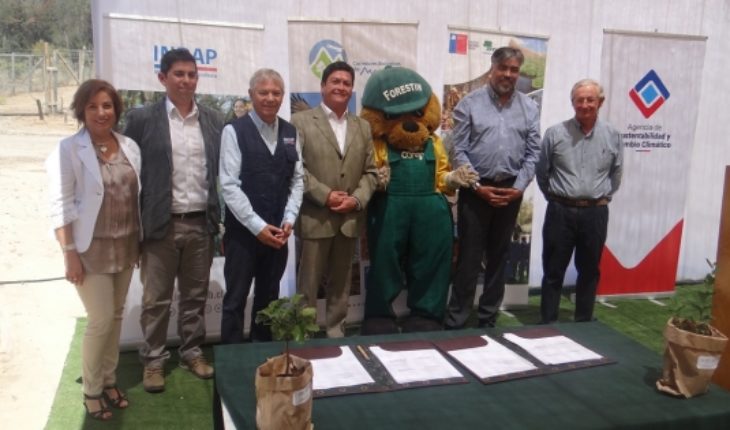Following the development of the first agreement of clean production (APL) allowing to incorporate forest management plans on 2,900 acres of Mediterranean native forest, was launched the second initiative of APL that seeks its Mar 10 thousand hectares of public and private property to SFM in the Region of Valparaíso.
In a ceremony held in the Lago Peñuelas national reserve, the Agency’s sustainability and climate change (ASCC) certified to the four properties, including the reserve, that met the standards set in the first agreement.
In addition, signed the second driven APL by the ASCC, Conaf, Ministry of the environment – through the GEF project runners biological mountain-, with the support of the Regional Administration, INDAP and the Seremi of economy, agriculture and environment.
Working together, started in 2016, granted to Mediterranean native forest owners an alternative to protection and sustainable use that avoids the replacement of forests.
The signing of the second pilot APL, is intended to extend the recovery, conservation and improvement of the quality and quantity of environmental services to a major forest area in the region.
Reaches the APL within the actions implemented in the framework of this partnership, are a group of 30 foresters training in the preparation of management plans for NLM under criteria of forest management, the promotion of the model and make recommendations to the existing regulations, including improvements to the schedule of fees of the law 20.283 with integrated and global approach.
Another important goal is to consider the premises with approved plans of the first APL as a permanent demonstration pilot areas. The opening of markets with value-added commodity buyers, on the other hand, seeks to improve the profitability of the use of the Mediterranean forest.
Giovanni Calderón, executive director of the ASCC, assessed the APL as “concrete action to recover, preserve and increase the economic value of the native forest, which today are so despised and highly threatened by the growth of cities, agriculture and” the fire”.
“By the way, we are helping to combat the effects of climate change,” he added.
Marianne Katunaric, national coordinator of the GEF project stated that “this APL promotes a model of intervention of our forests that protects his recovery, when it is degraded, and their attributes essential, including conservation values relevant biological diversity”.
In addition, has a high potential for replicability at the national level, “which is a great contribution to a series of commitments of our country in environmental matters, both in actions relating to Global climate change, sustainable development, and” efforts for the conservation of the natural heritage”.
Meanwhile, Jaime Riesco, representative of the consortium of private owners of Mediterranean forests of the Region of Valparaiso, said that “with the second APL, hopefully take best advantage of wood coming out and give more noble than that of coal and firewood uses”.
He also stressed “to ensure that people get excited and more hectares are incorporated, we need get a bonus from work, with the authorities since these fields are not profitable and ultimately end up parceled or planted with fruit trees”.
What is the forest management in Chile, the national climate change strategy formulated in 2016 proposed forest management, a tool created to manage the forests, as a solution to the degradation of forest causal second in Europe.
Forest management has its first official appearance in Chile in the 20.283 Act of 2009, but have never been implemented due to the ignorance of your application and integration of the management of the model in the public sector, and mainly by the disarticulation of the products that come from the management of the forest. I.e., they do not have markets explored and established to encourage the implementation of the model.
This innovative project seeks to lay the groundwork for cooperation in the medium and long term between the State and the private sector to promote the use of forest management as a tool for integrated management in the country.
In that vein, Conaf, José Manuel Rebolledo, executive director emphasized that “the APL I and II, come to relieve the role that plays the forest management in the native Mediterranean forest, to balance environmental, economic and social functions that meets this forest, especially for the central and semiarid region of Chile”.
He also stressed that it is “fundamental to the sustainability of rural areas and their inhabitants,” as also achieve international commitments that Chile took to achieve adaptation and mitigation to the effects of climate change.
translated from Spanish: Public-private partnership will add 10 thousand hectares of native forest with sustainable forest management
January 24, 2019 |





